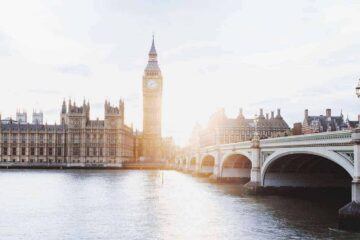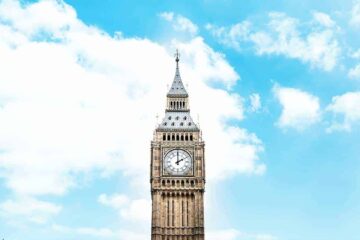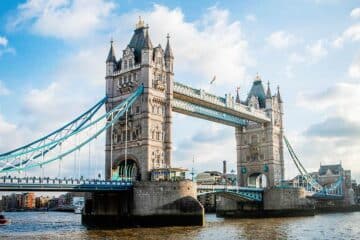Ready to discover the United Kingdom? In this backpacking guide for the United Kingdom, we’ll explore vibrant cities, serene countryside, ancient castles, and modern marvels. As you can see, the UK offers endless possibilities for adventurous souls.
Come with me to explore the wonders of the United Kingdom together and discover the best budget-friendly accommodations and insider tips to make your backpacking journey unforgettable
Guide Index
What to Expect: A simple Overview
Throughout your travels, you’ll have the opportunity to immerse yourself in the rich history, culture, and traditions of the United Kingdom. From visiting iconic landmarks like Big Ben and Buckingham Palace in London to exploring the stunning landscapes of the Scottish Highlands and castles that seem magical.
Transportation in the United Kingdom is well-developed, with an extensive network of trains, buses, and domestic flights connecting major cities and towns. Whether you prefer to explore by train, bus, or car, getting around the UK is relatively easy and efficient.
One thing to note is that budget accommodations in the United Kingdom can sometimes be subpar. Many places, particularly budget options, may appear old and not well-maintained. You might encounter worn-out carpets and dated facilities in some establishments. However, despite this, hostels remain a popular choice for budget-conscious travelers. Not only do they offer affordable accommodation options, but they also provide opportunities to participate in activities and meet fellow travelers, enriching your backpacking experience.
Travel Costs: Detailed Breakdown
These estimates include accommodation, meals, and basic daily expenses in the UK, but can vary based on factors like location, seasonal changes, and personal preferences.
Suggested Budget per Person per Day
- Low: £40 – £60
- Middle: £80 – £120
- High: £150+
Detailed Costs
Accommodation
- Low: Hostel dorms can range from £16 to £35 per night.
- Middle: Mid-range hotels or B&Bs often cost between £40 and £80 per night.
- High: For luxury hotels or upscale apartments, prices start from £150 and can go up.
Restaurants
- Low: pub food and daily menus in cafés can cost between £8 and £12. Look for Ploughman’s lunch (a cold meal featuring cheese, bread, pickles, and salad).
- Middle: Mid-range restaurants may charge £20 to £30 for a meal.
- High: Dining at high-end restaurants starts from £50.
Tips for Enjoying Cheap Food in the UK:
- Street Food & Markets: Explore local street food markets or grab a quick bite from food stalls for affordable and delicious options.
- Pub Fare: Enjoy traditional British pub grub, including fish and chips, pies, and hearty sandwiches, at reasonable prices.
- Supermarkets: Save money by purchasing groceries from supermarkets and preparing your meals in hostel kitchens or picnic spots.
Things to See and Do
A few highlights of what the United Kingdom has to offer.
Absolute Top Cities
London: Explore iconic landmarks such as Big Ben, Buckingham Palace, the Tower of London, and the British Museum. You can also enjoy West End shows (totally recommended!), stroll along the River Thames, and indulge in diverse culinary experiences.
Edinburgh: Wander through the historic streets of the Old Town, visit Edinburgh Castle, and hike up Arthur’s Seat for panoramic views.
Bath: Marvel at the Georgian architecture, relax in the Roman Baths, explore the Jane Austen Centre, and take a stroll along the picturesque Pulteney Bridge.
Historical Landmarks
Stonehenge: Witness the ancient stone circle and ponder its mysteries in the beautiful Wiltshire countryside.
York Minster: Visit one of Europe’s largest medieval cathedrals, explore the narrow Shambles streets, and learn about York’s Viking history at the Jorvik Viking Centre.
Hadrian’s Wall: Discover the remains of this ancient Roman wall that once marked the northern boundary of the Roman Empire.
Edinburgh Castle: Perched atop Castle Rock it has played a significant role in Scottish history, witnessing centuries of battles, royalty, and cultural evolution.
Natural Wonders
Scottish Highlands: Immerse yourself in breathtaking landscapes of rugged mountains, shimmering lochs, and picturesque glens. Explore the Isle of Skye, hike Ben Nevis, and seek out the elusive Loch Ness monster.
Lake District: Embark on scenic hikes, cruise along tranquil lakes, and admire panoramic views of rolling hills and quaint villages in England’s largest National Park.
Snowdonia National Park: Climb Mount Snowdon, explore ancient forests, and marvel at cascading waterfalls in this stunning Welsh wilderness.
Places related to legends and myths
Loch Ness: Loch Ness is famed for its elusive resident, the Loch Ness Monster, affectionately known as “Nessie.” Countless sightings and tales of this mythical creature have contributed to the lake’s reputation as one of the most mysterious and intriguing locations in the UK.
Hampton Court Palace: Once home to King Henry VIII, this Tudor palace is rumored to be haunted by various ghosts.
Borley Rectory: a former rectory in Essex gained infamy for its reported paranormal activity, including apparitions and unexplained phenomena. It is also known as “the most haunted house in England”.
Cultural Experiences
Traditional Afternoon Tea: Indulge in a quintessentially British experience with afternoon tea. That is not only a pot of tea, but a complete light meal that includes scones, clotted cream, sandwiches…
Shakespeare’s Birthplace: Step into the world of the Bard in Stratford-upon-Avon, visit Shakespeare’s birthplace, and catch a performance by the Royal Shakespeare Company.
Highland Games: Attend a traditional Highland Games event to witness Scottish sports such as caber tossing, hammer throwing, and Highland dancing, accompanied by bagpipe music and tartan-clad competitors.
Itinerary Ideas
One Week Itinerary
Day 1-2: London
- Explore iconic landmarks such as Big Ben, Buckingham Palace, and the Tower of London.
- Visit world-class museums like the British Museum and the Tate Modern.
- Enjoy a West End show in the evening.
Day 3: Oxford
- Take a day trip to the historic city of Oxford.
- Visit the prestigious University of Oxford colleges and Bodleian Library.
- Wander through the quaint streets and enjoy a pint in a traditional pub.
Day 4-5: Edinburgh
- Fly or take a train to Edinburgh.
- Explore the historic Old Town, including Edinburgh Castle and the Royal Mile.
- Hike up Arthur’s Seat for panoramic views of the city.
- Visit the National Museum of Scotland and enjoy Scottish cuisine.
Day 6: Glasgow
- Take a day trip to vibrant Glasgow.
- Visit the Kelvingrove Art Gallery and Museum.
- Explore the bustling city center and enjoy shopping and dining opportunities.
Day 7: Bath
- Travel to the picturesque city of Bath.
- Visit the Roman Baths and the Royal Crescent.
- Explore the charming streets and relax in the Thermae Bath Spa.
Two Weeks Itinerary
Days 1-3: London
- Spend the first few days exploring the highlights of London as outlined in the one-week itinerary.
Days 4-5: Oxford and Stratford-upon-Avon
- Take a day trip to Oxford and explore its historic university buildings.
- Visit Stratford-upon-Avon, the birthplace of William Shakespeare, and tour Shakespeare’s birthplace and Anne Hathaway’s Cottage.
Days 6-7: Edinburgh
- Fly or take a train to Edinburgh and spend two days exploring the city’s historic landmarks and cultural attractions.
Days 8-9: Scottish Highlands
- Rent a car and embark on a road trip through the Scottish Highlands.
- Explore the Isle of Skye, hike in Glencoe, and visit Loch Ness.
Days 10-11: Lake District
- Travel to the Lake District National Park in Cumbria.
- Enjoy scenic hikes, boat rides on Lake Windermere, and visits to picturesque towns like Ambleside and Keswick.
Days 12-14: Cardiff and Bath
- Travel to Cardiff, the capital of Wales, and explore Cardiff Castle and Cardiff Bay.
- Visit the stunning Brecon Beacons National Park for outdoor adventures.
- Return to Bath for relaxation and exploration of its Roman heritage and Georgian architecture.
Five-Day Itinerary: London and Brighton
One of my favorite places near London is Brighton, so I thought I would give you a 5 day itinerary to experience the best of both worlds: the cosmopolitan energy of London and the laid-back coastal charm of Brighton.
Day 1-3: London
- Visit landmarks such as Big Ben, Buckingham Palace, the Tower of London, and the British Museum.
- Take a stroll along the South Bank of the River Thames, visiting the Tate Modern and Shakespeare’s Globe Theatre.
- Enjoy West End shows, shopping in Covent Garden, and dining in diverse culinary hotspots.
Day 4-5: Brighton
- On day four, travel from London to Brighton, which is easily accessible by train.
- Spend the afternoon exploring the quirky shops and cafés of The Lanes.
- Relax on Brighton Beach, stroll along the iconic Brighton Pier, and take in the views from the British Airways i360 observation tower.
- Enjoy fresh seafood at one of the seaside restaurants and experience Brighton’s lively nightlife.
Where to Stay on a Budget in the United Kingdom
While the United Kingdom offers a wide range of accommodation options, staying on a budget can be a bit tricky due to the generally higher costs compared to some other destinations. However, there are still affordable choices available:
Hostels: For solo travelers or those looking to meet fellow adventurers, hostels are a fantastic option. Many hostels in the UK offer dormitory-style rooms at budget-friendly prices. Additionally, hostels often provide communal spaces, kitchen facilities, and organized activities, making them ideal for socializing and saving money on dining out.
Bed and Breakfast (B&B): Another option for budget-conscious travelers is bed and breakfast accommodation. B&Bs typically offer cozy rooms with breakfast included in the price. While they may not have the same social atmosphere as hostels, they provide a comfortable and affordable place to stay, often in charming and picturesque settings.
Budget Hotels: Additionally, there are budget local hotel chains scattered across the UK – like Premiere Inn and Travelodge, offering simple yet comfortable accommodations at competitive rates.
When booking accommodation in the United Kingdom, it’s essential to consider factors such as location, amenities, and reviews to ensure a pleasant and budget-friendly stay. With a bit of research and planning, you can find affordable lodging options that suit your preferences and allow you to make the most of your UK adventure.
Few Hostels we love
For a fully detailed guide, check all the best hostels in the UK here.
YHA Cambridge Hostel: Located in the heart of historic Cambridge, this hostel offers budget-friendly accommodation with modern amenities, perfect for exploring the city’s renowned universities and charming streets.
Castle Rock Hostel in Edinburgh: Set against the backdrop of Edinburgh Castle, this vibrant hostel provides comfortable beds and a lively atmosphere, making it an ideal base for discovering the Scottish capital’s rich history and cultural attractions.
Cwtsh Hostel in Swansea: Situated in the coastal city of Swansea, Cwtsh Hostel offers a warm Welsh welcome and comfortable lodgings, making it an excellent choice for travelers seeking affordable accommodation near Swansea’s beaches, parks, and cultural site
Islesburgh House Hostel: Overlooking Lerwick Harbour in the Shetland Islands, Islesburgh House Hostel provides cozy accommodations with stunning sea views, offering guests a peaceful retreat while exploring the rugged beauty of Scotland’s northernmost archipelago.
The Liverpool Pod Travel Hostel: Located in the heart of Liverpool’s vibrant city center, The Liverpool Pod Travel Hostel offers modern and compact pod-style accommodations, providing a convenient base for travelers to explore the city’s rich maritime heritage, cultural landmarks, and lively nightlife.
How to get around United Kingdom
Exploring the United Kingdom is easy, as it has an efficient public transportation network.
Trains
The UK has an extensive railway network, connecting major cities and towns across the country. National Rail services operate throughout England, Scotland, and Wales, offering fast and reliable connections. Have a look at the discounted rates, you can get them booking in advance.
Buses and Coaches
Buses and coaches provide comprehensive coverage across the UK for traveling to destinations not served by trains. National Express and Megabus are two major coach operators offering affordable intercity travel, with frequent services between major cities and rural areas.
In addition to long-distance coach services, local bus networks operate in cities, towns, and rural areas throughout the UK, providing essential connections to neighborhoods and communities.
London Underground (Tube)
Navigating the bustling streets of London is made convenient by the iconic London Underground, commonly known as the Tube. With an extensive network of lines and stations, the Tube offers quick and efficient transportation within the capital, connecting popular tourist attractions, business districts, and residential areas.
Ferries
Ferries are particularly essential for reaching destinations such as the Scottish islands, the Isle of Wight, and Northern Ireland. Operators like Stena Line, P&O Ferries, and CalMac Ferries offer regular services for passengers and vehicles.
Cycling
For eco-conscious travelers and outdoor enthusiasts, cycling provides a sustainable and scenic way to explore the UK’s landscapes. Many cities have dedicated cycle lanes and bike-sharing schemes, allowing visitors to pedal their way around urban areas and countryside trails.
Walking
With its wealth of picturesque countryside, historic trails, and coastal paths, the United Kingdom is a paradise for walkers and hikers. From strolls through city parks to challenging hikes in national parks, there are endless opportunities to discover the natural beauty and cultural heritage of the UK on foot.
Car Rentals
For travelers seeking flexibility and independence, renting a car offers the freedom to explore remote regions and hidden gems at their own pace. Rental agencies operate at airports, train stations, and city centers across the UK, providing a wide range of vehicles to suit different preferences and budgets.
Best Time to visit the United Kingdom
The United Kingdom experiences a temperate maritime climate, characterized by mild temperatures, abundant rainfall, and changeable weather conditions throughout the year. Overall, the probability of rain is highest during the autumn and winter months, with the west and north of the country experiencing more frequent rainfall compared to the south and east.
However, regardless of the season, be sure to pack waterproof clothing and plan indoor activities as alternatives just in case.
Spring (March to May): Spring is a delightful time to visit the UK, with milder temperatures and blooming flowers adding charm to the landscape. While rainfall is common during this season, the probability of rain varies across regions. Southern England tends to experience drier conditions compared to the north and west, making it an ideal time for sightseeing and outdoor activities.
Summer (June to August): Summer is peak tourist season in the UK, thanks to longer daylight hours, warmer temperatures, and a full calendar of events and festivals. While rainfall is still a possibility, particularly in the north and west, the likelihood of sunny days increases, making it an excellent time for exploring beaches, parks, and historic sites.
Autumn (September to November): Autumn brings cooler temperatures and shorter days to the UK, along with vibrant foliage and harvest festivals. While rainfall becomes more frequent as the season progresses, September often offers pleasant weather with fewer crowds, making it an underrated time to visit. Be prepared for occasional showers and pack layers for changing temperatures.
Winter (December to February): Winter in the UK is characterized by chilly temperatures, shorter daylight hours, and the possibility of snowfall in certain regions, especially in Scotland and the higher elevations of Wales and Northern England. While rainfall is still prevalent, particularly in the West, the holiday season brings festive cheer and cultural events to cities like London and Edinburgh.
Backpacking Essentials & Safety Tips
Safety Tips
Stay Vigilant: While the UK is generally safe for travelers, it’s important to remain vigilant, especially in crowded tourist areas and public transportation in the cities. Keep your belongings secure and be wary of pickpockets.
Emergency Contacts: Familiarize yourself with emergency contact numbers, including the police, ambulance, and fire services. Save these numbers in your phone and know how to access emergency services if needed.
Travel Insurance: Consider purchasing travel insurance that covers medical expenses, trip cancellations, and personal belongings. This provides peace of mind in case of unexpected emergencies or incidents.
Weather Preparedness: The UK’s weather can be unpredictable, so pack accordingly with waterproof clothing, sturdy footwear, and layers to adapt to changing conditions. Check weather forecasts, especially if engaging in outdoor activities.
Traffic Safety: Exercise caution when crossing streets, as traffic in the UK drives on the left-hand side of the road. Look both ways and use designated crosswalks, pedestrian signals, and pedestrian bridges where available.
Cultural Etiquette
Punctuality: Punctuality is highly regarded in the UK, so arrive on time for appointments, meetings, and reservations.
Queuing: British people take queuing (lining up) seriously, whether it’s at a bus stop, ticket counter, or café. Always join the end of the line and wait your turn patiently.
Respect Personal Space: Brits value their personal space, so avoid standing too close to strangers in public places or engaging in overly familiar behavior.
Politeness: Politeness and courtesy are integral parts of British culture. Say “please” and “thank you” often, hold doors open for others, and offer assistance if someone appears in need.
Pub Etiquette: When visiting pubs, observe local customs such as ordering drinks at the bar, waiting to be seated for meals (if applicable), and tipping bartenders for table service.
Things Not to Do
Don’t Litter: Dispose of trash responsibly in designated bins. Avoid littering in public spaces, including parks, streets, and beaches.
Don’t Skip the Queue: Cutting in line is considered rude and disrespectful in British culture. Wait your turn like everyone else, even if the queue seems long or slow-moving.
Avoid Loud Behavior: Brits tend to be reserved and appreciate quiet, especially in public places like libraries, museums, and public transportation. Keep noise levels down and respect the peace and tranquility of others.
Don’t Underestimate Distances: The UK may seem small on a map, but distances between cities and attractions can be deceiving. Allow ample time for travel – especially if you go to any of the London airports – and factor in potential delays due to traffic, weather, or transportation schedules.
Resources and Planning
Find all our favorite websites and apps for travel planning here.
BedandBreakfast.com: This website offers a wide range of B&B accommodations across the United Kingdom.
National Rail Enquiries: This app provides live train times and real-time journey planning for all train services in the UK. It also offers platform information, service updates, and ticket purchasing options.
Bolt: in case you need a taxi, Bolt offers ride-hailing services in several UK cities. It provides competitive fares and allows users to request rides quickly and easily through the app.
Conclusion
Your feedback is invaluable to us and to the Hostelgeeks community. It helps us keep this guide as current and comprehensive as possible, ensuring future backpackers can enjoy the United Kingdom to the fullest. So, whether it’s through comments, emails, or social media, please share your tales and tips from the road. Let’s make this guide a living document.
Ready to add ancient castles, cobblestone streets, ghost stories, and breathtaking landscapes?









